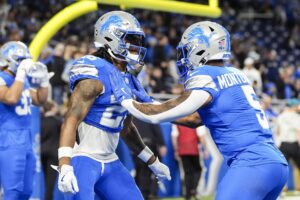The NFL Draft is right around the corner, and the Philadelphia Eagles are busy scouting out all of the best young talents in the nation. Hitting on your first-round pick is obviously important, but the key to a successful draft is finding impact players in the mid- to late rounds. Lenoir-Rhyne’s Kyle Dugger might not be the safest prospect in the draft, but he offers tremendous upside and should be available when the Eagles are on the clock in the third round.
Kyle Dugger 2020 NFL Draft Profile
Philadelphia Eagles NFL Draft Targets: Kyle Dugger
The first thing that jumps off the page with Dugger is his freakish athleticism. The Lenoir-Rhyne didn’t face the best competition at the college level, but he always looked like the player on the field. He proved that this wasn’t just due to the relatively underwhelming completion, as Dugger had one of the best performances at the NFL Combine.
According to MockDraftable, Dugger tested in the 78th percentile among safeties in the 40-yard dash and hit the 97th percentile on the broad jump and vertical jump. He also has the ideal build for the position at 6’-1”, 217 pounds, and 32 7/8” arm length. Athleticism isn’t everything, but it certainly doesn’t hurt.
Dugger uses his freak athleticism to cover large chunks of the deep part of the field. Blessed with fantastic burst, Dugger has the ability to go sideline-to-sideline and slow down the deep part of an opposing passing attack. He takes ideal angles to get to the ball and doesn’t waste time with unnecessary movement.
Dugger is more than just a one-trick pony, as he has the size required to play in the box and hold up against run support. This type of versatility is invaluable in today’s NFL, especially when the Eagles play in the same division as Ezekiel Elliott and Saquon Barkley. As if that wasn’t enough, Dugger can also make an immediate contribution in the return game. He has experience fielding punts, and his athleticism can translate to some explosive plays on special teams.
Weaknesses
Dugger has the potential to be a great safety in this league, but there are a few questions hanging over his head. For one, the safety spent his career playing for Lenoir-Rhyne and faced some laughably weak competition. Adjusting to NFL competition is hard for any NFL prospect, but Dugger will have an especially difficult time with the transition.
Dugger’s athleticism gives him elite range, but his anticipation leaves something to be desired. The safety is more reactive than proactive and usually waits for the quarterback to make his decision before he breaks on the ball. He got away with this in college, as the quarterbacks he went against weren’t good enough to take advantage of this flaw. NFL quarterbacks, on the other hand, might be able to pick this apart. In a similar vein, Dugger can sometimes get overwhelmed by underneath routes and take too long to diagnose what’s going on.
Ultimately, Kyle Dugger is a high-upside safety with a medium floor. While he has the athleticism to last in the NFL, he’ll need to improve his football IQ to reach his full potential. Whether or not he can do that is anyone’s guess, but his upside makes him well worth the risk in the third round.






